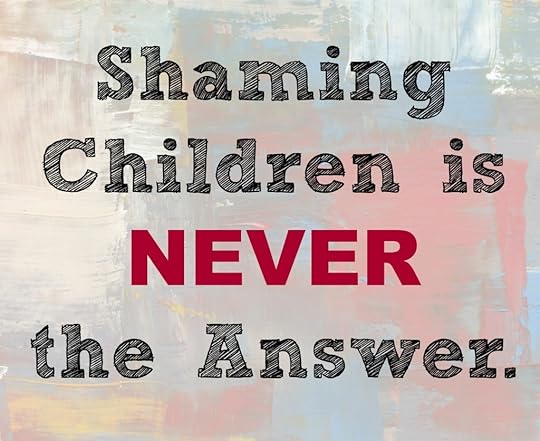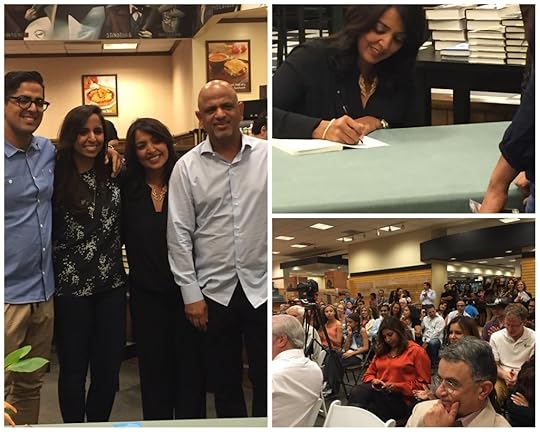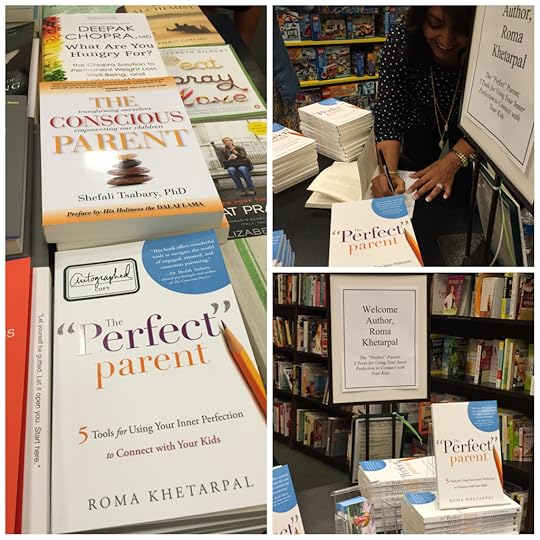Roma Khetarpal's Blog, page 28
December 4, 2014
Why Does Parenting Feel Like the "Hardest" Job in the World? (Part 1)
None of us are immune.
“I left you two messages, and you haven’t called back. Is everything okay”? asked my Mom more than once.
I finally broke down and complained, “I just didn’t find time, Mom. I’ve been so busy with the kids.” Then I added the most common parenting mantra: “Why is this is so hard, Mom?”
She giggled as she responded, “It’s just life. You should have thought of that before you had children.”
“But what does that even mean, Mom?” I said. “This is not something we can ever think of?”
She reality-checked me instantly, “And what do you want me to do about this?”
She was right, but I thought I’d have some fun, so I tried to trump her. After all this was pre-FaceTime, and she couldn’t see me. With a big smirk in my heart, I played it a little further, “Why did you not tell me how hard it would be?”
She exploded, “If I had told you, would that have stopped you? You didn’t have your children because I told you to. And maybe you didn’t know the first time, but if I remember correctly, you did have a second one three years later. I’m sure you knew then, no? Anyway, that’s just the way it is. You’ll be fine. How are the kids?”
Really, why does it feel so hard to raise children? After all, aren’t we adults who manage our jobs, homes, vehicles, finances, self-care, and sometimes our parents? Yes, it can get a bit much at times, and we go through peaks and valleys with our lives, but we are never challenged as consistently as we are challenged by our children! And, yet, we hear that it’s just the way it is, when we commit to raising children.
Well, let me tell you why I think that’s the case. Our living, breathing little loves are ever changing and growing. They are morphing internally and externally constantly and consistently. When our children change, they grow—not just physically—and as they grow, they change. And there we are, right beside them. Like a braid, life, parents, and children are intertwined to form an intricate external and internal experience that shapes both our own lives and our children’s. Each strand is perfectly and intricately connected. So when our children go through their growth phases, we have no option but to ride the twist and turns at their speed and their level of understanding. If they’re having a long, hard day and their emotions are flying all over the place, so are ours. The reverse is true as well: When we have had a hard day and our emotions are flying all over, we cannot help but affect them.
What really makes this ride seem “hard” is our own resistance to the process of change and growth. When our children are faced with an experience that pushes them to change, learn, and grow, we feel that aftershock. Our kids have life experiences that are different from ours—just as ours were different from our parents’. More often than not, we push back by losing our emotional balance. If we just remind ourselves that this is how life is designed to move forward, and that all we need to do is respond to this push calmly, the tugging and pulling naturally simmers down. In other words, our children’s growth pushes us toward our own growth, and we should respond by committing ourselves to that process.
It’s only our resistance that makes raising kids seem so “hard.” It’s being set in our ways and thinking our way is right. It’s not really listening and not letting them complete what they are saying before jumping in. It’s not being open-minded enough to listen to their very different point of view, let alone accept and respect it. This is how we set up roadblocks and stunt our own growth and theirs.
As adults we tend to get stuck, stagnate, and resist change, well, at least until our children come along and push for it. Have we ever considered that that’s why they come into our lives? To keep us changing and growing. Their very presence makes us more patient, kind, and compassionate emotionally; more alert, responsive, and dynamic intellectually; more connected, reflective, and committed spiritually.
Once we commit to allowing life to flow through us—by simply being open hearted and open minded toward change and growth—the push and pull eases up. When we turn down the volume of emotions, we melt the “hard” out of daily parenting. This commitment, this shift in perspective is the only change we need to make to take “hard” out of the equation.
In the next blog, we will discuss three simple tools of growth, or TOGs, that can move us toward applying this shift in our parenting perspective, amid the busy-ness of parenting. These three tools will lead us to letting down our guard and shifting “hard parenting” to “smart parenting.”
December 1, 2014
Why Does Parenting Feel Like the “Hardest” Job in the World? (Part 1)
We all have felt “this is so hard!” Sometimes it’s “hard” because we’re physically exhausted, and at other times, it’s because we’re mentally exhausted. And here’s the big one – it’s even harder when we’re emotionally exhausted! Of course, there are also those super hard times when we’re served a combination of the above.
None of us are immune.
“I left you two messages, and you haven’t called back. Is everything okay”? asked my Mom more than once.
I finally broke down and complained, “I just didn’t find time, Mom. I’ve been so busy with the kids.” Then I added the most common parenting mantra: “Why is this is so hard, Mom?”
She giggled as she responded, “It’s just life. You should have thought of that before you had children.”
“But what does that even mean, Mom?” I said. “This is not something we can ever think of?”
She reality-checked me instantly, “And what do you want me to do about this?”
She was right, but I thought I’d have some fun, so I tried to trump her. After all this was pre-FaceTime, and she couldn’t see me. With a big smirk in my heart, I played it a little further, “Why did you not tell me how hard it would be?”
She exploded, “If I had told you, would that have stopped you? You didn’t have your children because I told you to. And maybe you didn’t know the first time, but if I remember correctly, you did have a second one three years later. I’m sure you knew then, no? Anyway, that’s just the way it is. You’ll be fine. How are the kids?”
Really, why does it feel so hard to raise children? After all, aren’t we adults who manage our jobs, homes, vehicles, finances, self-care, and sometimes our parents? Yes, it can get a bit much at times, and we go through peaks and valleys with our lives, but we are never challenged as consistently as we are challenged by our children! And, yet, we hear that it’s just the way it is, when we commit to raising children.
Well, let me tell you why I think that’s the case. Our living, breathing little loves are ever changing and growing. They are morphing internally and externally constantly and consistently. When our children change, they grow—not just physically—and as they grow, they change. And there we are, right beside them. Like a braid, life, parents, and children are intertwined to form an intricate external and internal experience that shapes both our own lives and our children’s. Each strand is perfectly and intricately connected. So when our children go through their growth phases, we have no option but to ride the twist and turns at their speed and their level of understanding. If they’re having a long, hard day and their emotions are flying all over the place, so are ours. The reverse is true as well: When we have had a hard day and our emotions are flying all over, we cannot help but affect them.
What really makes this ride seem “hard” is our own resistance to the process of change and growth. When our children are faced with an experience that pushes them to change, learn, and grow, we feel that aftershock. Our kids have life experiences that are different from ours—just as ours were different from our parents’. More often than not, we push back by losing our emotional balance. If we just remind ourselves that this is how life is designed to move forward, and that all we need to do is respond to this push calmly, the tugging and pulling naturally simmers down. In other words, our children’s growth pushes us toward our own growth, and we should respond by committing ourselves to that process.
It’s only our resistance that makes raising kids seem so “hard.” It’s being set in our ways and thinking our way is right. It’s not really listening and not letting them complete what they are saying before jumping in. It’s not being open-minded enough to listen to their very different point of view, let alone accept and respect it. This is how we set up roadblocks and stunt our own growth and theirs.
As adults we tend to get stuck, stagnate, and resist change, well, at least until our children come along and push for it. Have we ever considered that that’s why they come into our lives? To keep us changing and growing. Their very presence makes us more patient, kind, and compassionate emotionally; more alert, responsive, and dynamic intellectually; more connected, reflective, and committed spiritually.
Once we commit to allowing life to flow through us—by simply being open hearted and open minded toward change and growth—the push and pull eases up. When we turn down the volume of emotions, we melt the “hard” out of daily parenting. This commitment, this shift in perspective is the only change we need to make to take “hard” out of the equation.
In the next blog, we will discuss three simple tools of growth, or TOGs, that can move us toward applying this shift in our parenting perspective, amid the busy-ness of parenting. These three tools will lead us to letting down our guard and shifting “hard parenting” to “smart parenting.”
The post Why Does Parenting Feel Like the “Hardest” Job in the World? (Part 1) appeared first on Tools of Growth.
November 24, 2014
This Thanksgiving, Tell Your Kids You’re Grateful for Them
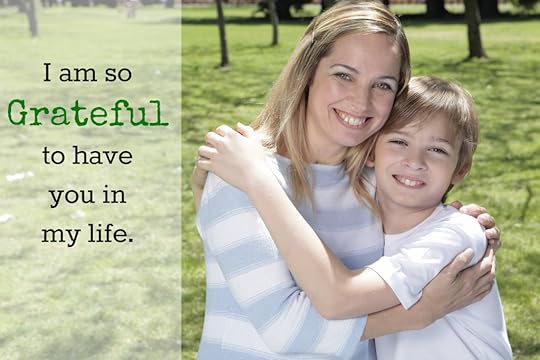
Some thoughts this Thanksgiving.
It is more common for us to give thanks from our hearts for our gifts of life than actually giving thanks out loud. Think about it: we associate gratitude with a feeling that is felt instead of one that is expressed. Most often, we thank out loud (or in writing) when we receive a gift or an act of kindness.
Here’s another example. We are grateful (in our hearts) for our kids, but are we grateful to our kids? In other words, we thank God (or life, or the universe, or whatever we believe in) for our children, but do we ever thank our children… OUT LOUD? Now please note that I’m not referring to “What would I do without you?” or “You add meaning to my life.” I am referring to the simple power of saying, “I am so thankful that you are my child,” or “I am so grateful to have you in my life” or “Thank you for being my daughter.”
As adults, we all know and have felt the profound effect the words “thank you” have on us. I also believe that it is that feeling when we receive gratitude that actually makes us want to give thanks and pay it forward. As humans we are wired to pass on sentiments of “feeling good”. Does it not make sense, then, that we should tell our kids how thankful we are for them and get them familiar with this feeling so that they can become comfortable with passing this “good feeling” on, and grow to be grateful children, teens, and young adults?
Besides saying “thank you” for things done or received, I believe that the “good-est good feeling” is telling someone how thankful you are for his or her presence in your life. Not just knowing it, thinking it, and feeling it, but actually putting it in words or THANKING OUT LOUD. Thanking out loud is the highest honor that we can give to our kids about their presence in our lives.
So go ahead, along with telling your children “I love you,” tell them, “I thank you…” The “thank you” is not for being good or doing good, but just for being your children! In return, your children will tell you the same if they haven’t already.
It’s no wonder that UC Berkeley is investing $5.9 million in a three-year research project, on Expanding the Science and Practice of Gratitude!
On a personal gratitude note:
Thank you to all my TOG fans that follow my blog and are in my classes. Thank you to all of you for sharing your wonderful comments, thoughts and suggestions with me. It is because of all of you that I am inspired to continue on this journey. Wishing all of you and your families a happy and healthy Thanksgiving… every day.
In Joy,
Roma
The post This Thanksgiving, Tell Your Kids You’re Grateful for Them appeared first on Tools of Growth.
November 20, 2014
You Just Don't Understand
How did we go from understanding them completely in their younger years — their expressions, their sounds, their body language, their mumbled-jumbled first words — to them saying, “You just don’t understand?” Did we really stop understanding them at some point or do they just think that we did? What does the word “understand” really mean? In the world of parenting, I think the word “understand” is an adaptable one. The way we understand children depends on their age.
At their youngest (until they start talking around age 2), we need to understand all of their pre-verbal signals: body language, behaviors, sounds, and then early words. Parents can translate from these modalities into understanding needs, feelings, and perceptions. As the child enters toddlerhood, they are likely to express their needs and wants even more creatively!
Once they primarily use words to tell us what they want, need or feel, we start to rely more and more on these words. We also teach our children how to use words well in order to develop their expressions and their social and emotional skills. For example, “I am really mad at my friend, because she didn’t want to play with me today.” The parent then responds with comforting the child and telling her what to do to handle the issue in order to protect her. This phase of telling children “what to do” is a phase that lasts a number of years. In fact, one of the major challenges for parents is to move OUT of this phase! Of course, it springs from the need to protect and direct our children, but somehow we tend to get stuck here — ALWAYS TELLING OUR KIDS WHAT TO DO! In this protecting and directing of our children, we often forgot to listen to their thoughts and opinions causing a disconnect!
This is exactly what children mean when they say, “You just don’t understand!” They mean that we are disconnected with what they are thinking and feeling and trying to say. They feel that we are not listening to them and hence cannot relate to them. Furthermore, when we continue to tell our kids what to do, we disengage and deactivate their ability to make decisions, resolve issues, be resilient and self reliant–all of which hurts their self-confidence and self-esteem. In the short and long run, this is detrimental to both the future of our children and our relationship with them.Our role as parents is to empower our kids to be able to make decisions and to protect and direct themselves so that they can grow to be healthy teenagers and young adults. Our hope for them is to be good role models for themselves, their friends, their peers, and eventually their own children. We can do this by simply staying connected with them while we protect and direct them. Stay connected and support them by:
1. Listening to what they are trying to say.
2.Watching their expressions and body language and really “feeling” what they are feeling.
3. Encouraging them (kindly!) to resolve the issue on their own. For example, by asking, “What do you think you should do?”
This is how we can under-stand our kids instead of over-standing them. Under-standing our kids is supporting and empowering them by listening, learning, connecting, and helping them make decisions. Over-standing our kids is weakening and over-powering them by interrupting their thoughts and telling them what to do.
This is how we can empower our children so that they FEEL and KNOW that we do understand them! This is how we can empower ourselves to be true to our responsibilities as parents.
“Peace cannot be kept by force; it can only be achieved by understanding.”
Albert Einstein
November 17, 2014
“You just don’t understand!”
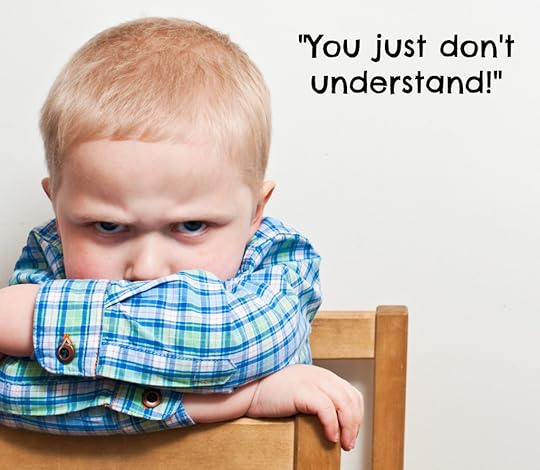
One of the most unique gifts of parenting is our ability to understand our children like no one else can. Why is it, then, that kids so often say, “You just don’t understand!” to their parents?
How did we go from understanding them completely in their younger years — their expressions, their sounds, their body language, their mumbled-jumbled first words — to them saying, “You just don’t understand?” Did we really stop understanding them at some point or do they just think that we did? What does the word “understand” really mean? In the world of parenting, I think the word “understand” is an adaptable one. The way we understand children depends on their age.
At their youngest (until they start talking around age 2), we need to understand all of their pre-verbal signals: body language, behaviors, sounds, and then early words. Parents can translate from these modalities into understanding needs, feelings, and perceptions. As the child enters toddlerhood, they are likely to express their needs and wants even more creatively!
Once they primarily use words to tell us what they want, need or feel, we start to rely more and more on these words. We also teach our children how to use words well in order to develop their expressions and their social and emotional skills. For example, “I am really mad at my friend, because she didn’t want to play with me today.” The parent then responds with comforting the child and telling her what to do to handle the issue in order to protect her. This phase of telling children “what to do” is a phase that lasts a number of years. In fact, one of the major challenges for parents is to move OUT of this phase! Of course, it springs from the need to protect and direct our children, but somehow we tend to get stuck here — ALWAYS TELLING OUR KIDS WHAT TO DO! In this protecting and directing of our children, we often forgot to listen to their thoughts and opinions causing a disconnect!
This is exactly what children mean when they say, “You just don’t understand!” They mean that we are disconnected with what they are thinking and feeling and trying to say. They feel that we are not listening to them and hence cannot relate to them. Furthermore, when we continue to tell our kids what to do, we disengage and deactivate their ability to make decisions, resolve issues, be resilient and self reliant–all of which hurts their self-confidence and self-esteem. In the short and long run, this is detrimental to both the future of our children and our relationship with them.Our role as parents is to empower our kids to be able to make decisions and to protect and direct themselves so that they can grow to be healthy teenagers and young adults. Our hope for them is to be good role models for themselves, their friends, their peers, and eventually their own children. We can do this by simply staying connected with them while we protect and direct them. Stay connected and support them by:
1. Listening to what they are trying to say.
2.Watching their expressions and body language and really “feeling” what they are feeling.
3. Encouraging them (kindly!) to resolve the issue on their own. For example, by asking, “What do you think you should do?”
This is how we can under-stand our kids instead of over-standing them. Under-standing our kids is supporting and empowering them by listening, learning, connecting, and helping them make decisions. Over-standing our kids is weakening and over-powering them by interrupting their thoughts and telling them what to do.
This is how we can empower our children so that they FEEL and KNOW that we do understand them! This is how we can empower ourselves to be true to our responsibilities as parents.
“Peace cannot be kept by force; it can only be achieved by understanding.”
Albert Einstein
The post “You just don’t understand!” appeared first on Tools of Growth.
November 3, 2014
Would You Publicly Shame Your Child as Punishment?
THE ISSUE
A father discovered that his 10-year-old daughter, who was 5 feet, 9 inches tall, had secret accounts on social media and had been dating behind his back, all against his rules. His response was to put her in a pink T-shirt that stated her age and grade in school, plus hair curlers and a backpack, and post several pictures of her on Facebook.
ROMA’S TAKE
Clearly, this ten-year-old child has self-esteem issues about her height and appearance, and these issues are far from easy to self-manage, especially at her age.
She is flouting her dad’s rules to explore the kind of attention her looks will bring her, in an attempt to manage this lack of self-esteem and to build some self-confidence.
Yes, we all want to protect our children, especially when they are exposing themselves to high-risk situations. But unless you plan to accompany your kids everywhere for the rest of your lives, that’s impossible. What we need to do to help our children thrive is build their self-confidence, so that they become in-dependent—dependent on themselves. What this father is doing is the opposite. And not only is it a disservice to his child’s inner well-being but he’s also setting up his child for failure and hurting their relationship in the process. Furthermore, by publicly humiliating her, he is adding shame and embarrassment to her already bruised self-esteem and self-confidence.
When children have low self-esteem and self-confidence, they are less likely to communicate. That’s where this father needs to start: with building better communication skills with his daughter so that she is comfortable coming to him about underlying issues. If there is no mother or female figure in the relationship, he might seek out professional help to assist the girl in identifying her feelings and understanding and managing them. In other words, he should help build her emotional intelligence skills, which, research clearly states, are important in developing communication skills, enhancing decision-making capabilities, and adding to life success for children.
No one wants to be publicly humiliated when they make a mistake! The social media attention simply piles on extra layers of complicated emotions that will make it harder for this girl to understand herself or to deal with day-to-day issues in the future. As expert Brené Brown tells us, kids who have an understanding of how and why their feelings are what they are, are much more likely to talk to us about what’s happening, and they have better skills to work it out.
Remember, this girl is only 10! Adding this kind of public drama to her life will just create shame, resentment, and anger, Adds Brown: “Shame is the most powerful, master emotion. It’s the fear that we’re not good enough.”
And if you think you’re not good enough at ten, then the father better be prepared for a rude awakening. If he does not get his act together and work toward the best interests of his child, he will be faced with real-life problems that none of us want for our kids—like teenage pregnancies, drugs, and so on. When his child clearly needs guidance through her tender issues, why is he focusing on the media attention that he surely knew he would get once his response became public? I find it very interesting that the father is publicly humiliating his daughter for seeking attention online when that is exactly what he is doing.
SOLUTION
Build your child’s self-esteem and self-confidence, not by adding shame and resentment to it but by being kind and turning down the volume of her emotions of self-discovery. In that way, you’ll be able to access her intellect and help her make sense of, understand, and accept her differences. Be empathetic. Put yourself in her shoes, and support her feelings. And if, as a parent, you are unable to offer that kind of growth-based support, then find someone who can.
While the importance and structure of guidelines should not be undermined, no lasting lesson can be learned when we resort to public humiliation of our children.
And how can our children learn to use social media responsibly if we don’t set the example?
The post Would You Publicly Shame Your Child as Punishment? appeared first on Tools of Growth.
October 31, 2014
Parenting Doesn’t Come With a Manual
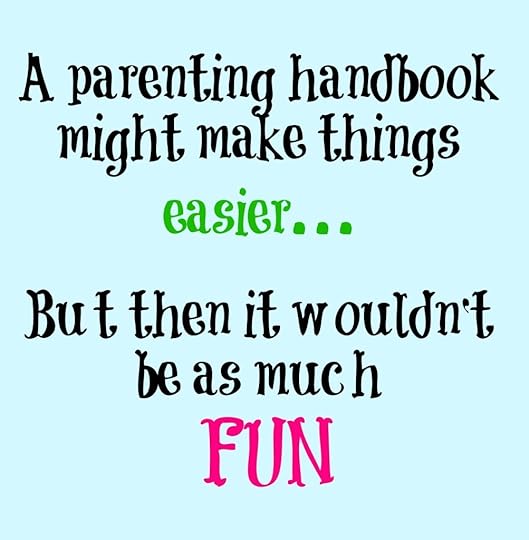
Parenting doesn’t come with a manual!
That’s true, but then understanding yourself does not come with a manual either. Parenting is a new role that we take on, and just like anything new to be learned, it is a work in progress. Like playing basketball or the piano, the more you practice, the better you get at it. And the longer you practice, the more comfortable you feel.
If you are following this blog, then it’s safe to assume that you are a parent who is willing to practice your skills consciously so that you can do the best job you are able to do. Because, let’s face it, parenting is the most important job you’ll ever do! Let me reassure you, though, that it’s also the easiest and most satisfying job you’ll ever do, if you put your mind to it.
My goal isn’t to teach you “parenting,” because that’s not something you can teach. You already have those innate skills. I’m here to help you uncover them. I’m here to give you tools of communication – tools of growth – that will help you be a happy, relaxed parent so that you can raise happy, relaxed children. And when your children have children of their own, you’ll have a great relationship with them and can proudly move on to your next phase of life. You’ll —know that your children are independent and capable of being mindful parents, because you were one. You will have set the example for them to be good parents by being honorable, approachable, sensible, reasonable and responsible. These 5 communication tools are what I share with you through this blog and my new book, The “Perfect” Parent, 5 Tools for Using Your Inner Perfection to Connect with Your Kids.
The post Parenting Doesn’t Come With a Manual appeared first on Tools of Growth.
October 27, 2014
Sharing The “Perfect” Parent Message
The past few weeks has been a whirlwind of meeting people, sharing Roma’s message, and watching her sign a lot of The “Perfect” Parent books. It’s been humbling to speak with parents and educators who have used the tools in the book in their everyday life with communicating with children. The message is simple… you are the “perfect” parent for your child.
Three events were held at the Barnes & Noble in Valencia, California. On October 10, a full house of parents came to hear Roma speak about her journey in writing The “Perfect” Parent. What made this evening extra special was that her entire family came out to support her. Her children gave a heartfelt introduction and it was clear that Roma has practiced what she preaches.
On October 16, Barnes & Noble in Valencia also hosted a special Educator’s event for local teachers and administrators. The tools in The “Perfect” Parent, as Roma explained, can be used in the classroom as well as at home. Everyone can benefit from learning how to communicate better with kids.
Friday evening, October 24, was Local Author Night at Barnes & Noble in Valencia. Several authors were on hand to speak with fans and sign their books. It was an incredible experience to really get to know other local authors and even future authors.
This past weekend, Roma traveled to Barnes & Noble in Redlands, California for another book signing and mini workshop. She covered topics such as:
• What is a parenting makeover and why we need one.
• The five tools of communication and how can they help assuage a parent’s doubt, guilt, worry and fear that often accompany the challenges of raising a child.
• How parents empower their children when they understand themselves.
• How to use one’s internal “parental guidance system” to build a solid relationship with one’s children.
• How parents can simplify the parenting experience and amplify the enjoyment.
• What defines good communication between parent and child.
Future book signings and appearances are currently being scheduled for Southern California. Check back often for our entire event schedule.
The post Sharing The “Perfect” Parent Message appeared first on Tools of Growth.
October 21, 2014
Chasing Perfection: The Effects on the Parent/Child Relationship
How does our chase to be the “perfect” parent fit in to the parent/child relationship?
We’re probably all guilty of looking at some parent and child and asking, “How could they do that? I’d never treat my child that way.” After all, from the moment parents finds out they will have a baby, they naturally begin setting themselves up to do it right. They want to do their very best for this new life that they are going to bring forth. These are the very first seeds that parents plant within themselves to be the “perfect” parent. And they do it all subconsciously.
We all want to do the best for our children. We want to embrace this new relationship with authority, knowledge, and yes… perfection. To “get it right,” we read parenting books and blogs, and we talk to our friends and family about the right way to raise a child. Yet, the truth is that one person’s way of raising a child might not necessarily work for you and your precious one. And, of course, what might work for one of our children, might not work for another.
Parents today are under extreme pressure to get their kids into the right schools and the right sports. Many parents feel like they need to compete with neighbors, relatives, and their kids’ school friends. But we’re missing the big picture. We spend so much time trying to organize activities and getting caught up in the “doing” of things that we lose sight of what’s really important — the communication between ourselves and our children. If that breaks down, everything else goes with it. But when the lines of communication remain open, our relationship becomes a lifelong ride of enjoyable memories, despite the challenges. And isn’t that what we all want?
Roma Khetarpal, the author of The “Perfect” Parent shared some of her views on SCV-TV.
The post Chasing Perfection: The Effects on the Parent/Child Relationship appeared first on Tools of Growth.
October 17, 2014
The Musical Notes of Gratitude, an excerpt from The “Perfect” Parent
Parenting can often seem a thankless task. Sometimes we get so caught up in worrying about the minor problems and challenges that we forget to be grateful for what we have. From The “Perfect” Parent, some perspective:
Thank you is one of the first phrases we teach our children, and when they learn to apply it well, it makes every parent laugh and beam with pride. Thank you is a verbal delivery of gratitude, which is how we think and feel about something in our hearts. Thank you acknowledges appreciation, thoughtfulness, and kindness. And researchers in the field of positive psychology have also proved that expressing gratitude boosts the self-worth, self-esteem, self-confidence, and happiness of both the giver and the receiver. The phrase has a ripple effect!
Gratitude is a great perspective shifter, and one way that we can all easily invite it in is by having a quick, personal parenting gratitude affirmation. It could be a favorite quote or a sentence you make up that resonates for you. The statement I am grateful for my beautiful children, despite the challenges adjusts my attitude to one of gratitude every time. I try to remind myself of it right before I’m about to tackle a pressing parental dilemma. And when I forget, life shows up–for example, in the form of my friend who lost his son–to remind me of it.
What is your personal gratitude affirmation? It can be as simple as “I am so blessed to have these children” or as personalized as you wish. Gratitude truly is an attitude adjustment.
The post The Musical Notes of Gratitude, an excerpt from The “Perfect” Parent appeared first on Tools of Growth.

